- Home
- Donald Hamilton
Murderers' Row Page 2
Murderers' Row Read online
Page 2
I said, “Yes, sir. So we are throwing this agent of ours, Jean, down the rathole to see where she comes out. If she comes out. What makes you think they’ll fall for her alcoholic act, sir?”
“That is your job, to make them fall for it,” he said. “Don’t forget, they will want to fall for it. They do not normally get any of our senior people alive and willing to talk. They’d like to know more about us. There’s still a body of official opinion over there to the effect that no decadent democratic society could possibly support a tough agency like ours; that we’re a fiction invented by our opposite numbers over there to excuse their failures. There are people over there who would be very glad to have an agent of ours put on exhibit. I think they will take the bait if it is properly presented.”
I nodded. “And suppose they do accept Jean for what she claims to be, a potential deserter, what then?”
“Her original orders were to identify the route and the lay-over station, as well as the people involved, as far as possible. Then she was to extricate herself by any available means, and report. No other action was required of her.”
“I’d say it was plenty, sir.”
“Yes. Unfortunately, I have had to modify those orders in the light of new information.” He hesitated, then he drew a piece of paper towards him, took the ball-point desk pen out of its holder and printed a single word. He replaced the pen and pushed the paper across the desk towards me, turning it so that I could read what he had written. “Do you know what that word means, Eric?”
I looked at the paper. The word, printed in capital letters, was AUDAP. It meant nothing to me. “No, sir. They play so many games with the alphabet around here, I’ve given up trying to figure them out.”
Mac took back the piece of paper and drew an ash-stand closer. He burned the paper carefully, powdered the ashes, and tripped the trap to let them fall into the base of the stand.
“That word,” he said, “represents one of the most highly classified secrets in Washington, and you’ve never seen it, of course.”
“Of course.”
“It’s very, very secret,” he said. “Only we and the Russians know about it, nobody else.”
“I see.”
“They do not, however, know as much as they would like. Do you know anything about submarines, Eric?”
“Yes, sir. They travel under water.”
“Until recently this was not strictly true,” Mac said. “Until recently, a submarine was a surface vessel capable of submerging for short periods of time. Even so, it was a potent naval weapon. Why?”
“I suppose, because when it’s submerged, you can’t see it.”
“Precisely. And with the advent of, first the snorkel, and then nuclear power, enabling the boats to go under water and stay there,his advantage has increased tremendously. Radar doesn’t work under water. Sonar is relatively short range and unreliable; besides, the instrument has to be in the water to be effective. This makes it impractical for use from fast search airplanes; the only way large sea areas can be efficiently patrolled.” He looked at me across the desk, like a teacher in a classroom. “Do you know which weapon of ours the Russians fear most?”
I shrugged. “The big bombers, I suppose, sir. Or the Atlas missiles with nuclear warheads.”
“If they haven’t found some kind of an answer to bombers yet, after all the time they’ve had to work at it, they’re not as smart as I think. And the big intercontinental ballistic missiles still have to be fired from fixed sites which can be located by intelligence work—we don’t make it very difficult—and more or less neutralized by other missiles or by sabotage. No, the weapon they really fear is the weapon they can’t neutralize because they can’t find it. It is the weapon we operate out of Holy Loch, Scotland: the Polaris submarine.” Mac got up and walked to the window and spoke without looking around. “Of course, what I have told you is the Navy version. An Army or Air Force man might give a different picture. Still, the admiral who explained the situation to me was most persuasive.”
“Yes, sir.”
“Each Polaris submarine carries sixteen Polaris missiles,” Mac said, regarding the sunny view outside. “At present the range is about a thousand miles, but it is being extended. We have—the exact number is confidential—say, half-a-dozen of these submarines operational, but more are being built. Even the halfdozen already on patrol in northern waters give the man in the Kremlin a great deal to think about at night, I should imagine. Six times sixteen is ninety-six nuclear missiles, waiting invisibly under the ocean within range of his major cities. The submarines don’t even have to surface to shoot. There’s nothing he can do about them—unless he can locate them first.” He paused. “The word I wrote down for you, AUDAP, stands for a little gadget just invented known as an Airborne Underwater Detection Apparatus.”
There was a short silence. Mac swung from the window and returned to his chair and sat down facing me. He put the tips of his fingers together delicately, and looked at them.
“We don’t know,” he said, “the mind of the opposition. We don’t know how close they are to taking the big gamble. We do know that, even discounting Navy enthusiasm, the Polaris submarine must be a powerful deterrent. But if they should get their hands on a device that gave them some hope of neutralizing that deterrent—” He shrugged expressively.
“Have they?”
“No,” Mac said. “The device is safe. The plans are safe. However, the man who invented the device and drew up the plans has disappeared, a gentleman named Dr. Norman Michaelis.”
“I see.” I frowned thoughtfully. “Was he kidnaped or did he go under his own power?”
“He was on vacation, resting up from his labors on AUDAP. He disappeared while sailing alone on the Bay in a small boat. The wind dropped towards evening, as it does. Some people in a power boat offered him a tow, but he refused it, saying he’d work his way in under sail. Well after dark, the friends with whom he was staying went out in a motor cruiser to see how he was making out. They found the boat sailing merrily along on the evening breeze with no one on board.”
“The fact that he refused a tow might indicate something.”
“If you don’t know sailors,” Mac said, “it might. However, a real sailboat man—as Michaelis seems to be—would rather spend all night trying to get home on a whisper of breeze, rather than be snatched into port at the end of a towline.”
“I’ll take your word for it,” I said. “This nautical kick is out of my line.”
“The details don’t matter, and the question of whether or not Michaelis absconded voluntarily is also quite irrelevant. Whatever he knows, he can be made to tell, you know that. If they once get him over there, and their experts get to work on him with the latest drugs and interrogation techniques, he will talk freely whether he wants to or not. They all do. It must not be allowed to happen. That is why we—you—have to take such drastic means to bring matters to a head where Jean is concerned. We have to sell them on her, very quickly. If we have luck, and Michaelis and she are held for the same shipment— apparently they don’t ship very often, which improves our chances. But they have to be persuaded to take her soon, while he is still within reach.”
“This is getting to be quite an order our girl is being handed. Now, not only does she have to fool these people, learn all about them and their organization, whatever it is, and make her getaway, she’s got to escape with a helpless Ph.D. on her back.”
“Dr. Michaelis isn’t quite helpless. As a matter of fact, he’s well under fifty, athletic, and considered handsome in some quarters.”
“Sure. They’re all personality kids, these days, and in a tough spot I’d trade them all for one ugly old-timer with store teeth or no teeth at all.”
Mac said, as if there had been no interruption, “And I am not ordering Jean to escape with Dr. Michaelis, even if she does have the good fortune to reach him.”
I looked at him. “I’m kind of slow, sir. You have to bring me along by easy st
ages.”
“If she can rescue him, that will be fine,” Mac said quietly, “but as you point out, it could well turn out to be an impossible task.”
“So?”
“Jean’s orders are quite simple and specific,” Mac said. “You may as well know what they are; they apply to you if by some remote chance you should find yourself in a position to carry them out.” He looked at me over the desk. “Our instructions specify only that the knowledge in Dr. Michaelis’ head must not leave the country,” he said deliberately. “How to achieve this result is left entirely to the discretion of the agent on the spot. No questions will be asked. Do you understand?”
I drew a long breath. “Yes, sir,” I said. “I understand.”
3
Waiting in the motel room, I did not think about this. It wasn’t something you’d pick to while away the lonely minutes, and it was Jean’s problem, anyway.
Instead, I glanced at the wrinkled paper to pass the time, and learned that a hurricane named Eloise was giving Florida a tough time; it had been expected when I came through from Cuba. The paper didn’t say how far north it might be felt. Well, bad weather is usually an advantage, if anything, in our line of work; besides, I hoped to be through with the job long before the storm had time to work its way up the coast—through, and on my way to Texas.
I tossed the paper aside and thought about Gail Hendricks. To be sure, our date had been very tentative— as tentative as the leave that had been promised me after the last assignment—but I’d made the mistake of wiring that things looked promising when I first hit Washington, and now I’d had to wire again. She wasn’t any Penelope to wait years for her Ulysses.
I heard my people coming well before they reached the door. There were two of them, as I’d been told there would be. The man was delivering Jean right on the dot of ten-thirty, as he was supposed to. She was giving him a loud, drunken argument, as she was supposed to. They paused outside long enough to let me rise and take shelter in the bathroom. Then the door opened.
“I’m all right, I tell you!” Jean was protesting. Her voice was slurred. “Won’t you please, please, please leave me the hell alone? The way you hang around watching me, anybody’d think I was sick or something—or that somebody didn’t trust me!”
The man sounded reasonably sober. He had a young, embarrassed voice. “It’s not that, Jean. It’s just, well, I’m supposed to stick around and, well, help you through this phase.”
“Just because some snoop saw me taking a little drinkie, I’ve got to have a guardian!” she complained. “What’s the matter, is somebody afraid I’m going to talk too much, or something? What I do to my liver is my own damn business!”
“Please, Jean. Not so loud. Here, let me—”
“Keep your cotton-picking hands off me!” Her footsteps came across the room unsteadily. I heard the bottle rattle against the glass as she poured herself a drink. “Not so loud!” she mimicked. “You’re always telling me not so loud! Don’t drink so much, don’t talk so loud. Like a nice little boy saying please Mama don’t make another scene. How old are you, anyway, honey? I swear you make me feel like Mrs. Methuselah!”
The young male voice was stiffly self-conscious. “I don’t really think my age is pertinent to the discussion.”
“Pertinent!” She laughed. “Well, I’ll talk as loud as I damn please, hear? And I’ll talk about what I please! I’ll even talk about—Do you know what folks in the know call that house in Washington we operate out of? They call it Murderers’ Row, that’s what they call it, and a damn good name, too! But we’re not supposed to talk about that, are we? Not even in whispers, heavens no! We’re not supposed to talk about the house, and if we go there, we can’t drive straight to the door even if it’s raining. Oh, no, we’ve got to get out blocks away and make sure nobody’s following—”
“Please, Jean! This room hasn’t been checked. It may be wired for all we know!”
She paid him no attention. “—and we mustn’t ever, ever tell anybody what we really do, not on your life! And of course we mustn’t say a word about the horrible gray man who sits in that upstairs office in front of that bright window and sends us out to—no, I won’t shut up! If people only knew the dreadful things that are done in the name of peace and democracy! Horrible things!”
I heard her gulp at her drink. The man said hastily, “All right, Jean. All right. We’ll talk about it when you’re not—when you’re feeling better. I’ll be going now, but I’ll be right next door as soon as I’ve had a cup of coffee. Call me if you need me. Remember, we’re all trying to help you. Just don’t make it too hard for us.”
“If thatsh a threat,” she said thickly, “if that’s a threat, to hell with you, honey! You don’t scare me a bit. You don’t scare me one little bitty bit, hear?”
“I didn’t mean—good night, Jean.” He seemed to hesitate. “I—er, good night.”
He moved away. The door opened and closed behind him. I glanced at my watch. It read ten-forty. His timing was good and he’d delivered his lines pretty well. But Mac had been right. This was, of course, the kid with the weak stomach—code name Alan—who’d refused to do the job; and I was ready to agree that he’d have botched it. It wasn’t a job for a sentimental kid; particularly not a sentimental kid who, by his voice, was desperately in love with the somewhat older agent he’d been assigned to watch.
I now had twenty minutes while he drank his coffee, before witnesses. I pushed the bathroom door aside and went in there. She was standing by the big bed, swaying slightly. From the information I’d been given, the appearance of her room, and the sound of her voice, I’d expected a sodden female bum, but she looked surprisingly good, considering.
She was wearing a simple, long-sleeved black dress with a lot of pearls at the throat—the kind of standard dress-up outfit in which they can look reasonably well-groomed as long as they can stay on their feet and keep their stockings up. She was obviously loaded, sure, but at first glance she looked just like an attractive suburban housewife who’d overestimated her capacity at somebody’s cocktail party and would be dreadfully embarrassed in the morning, wondering if anybody’d noticed.
Upon further examination, of course, I could see that the attractive picture was terribly out of focus in a very fundamental way. This wasn’t just a pretty woman who’d had one too many, slightly rumpled, apologetic, and appealing. This was—or seemed to be—a real lush, going downhill fast.
“Hello, Jean,” I said, coming forward.
She waited for me to reach her, and looked up. Most women have to, even the tall ones, and she wasn’t very tall. She had soft, light-brown hair, a little mussed now, and bright, baby-blue eyes, a little bloodshot. Her hands made a clumsy, mechanical gesture towards tidying the hair, while the eyes searched my face.
I guess she’d been wondering what kind of a guy would be sent to do the job friend Alan had turned down. She’d agreed to have the operation, but she wanted to know that the surgeon was a capable man. It was a reasonable attitude; but she looked hard enough and long enough for me to wonder if she’d forgotten her lines. Then she moistened her lips with her tongue, and said, as she was supposed to, “Who—who are you?”
“Never mind names,” I said. “You can call me Eric if you like. A man in Washington asked me to look you up. He’s disappointed in you, Jean, very disappointed indeed.”
“What—what do you want?”
There was a nice note of drunken apprehension in her voice, but she shouldn’t have worn those pearls. Close up, I could see that they were too big and perfect to be real, just costume jewelry; nevertheless their luster made her skin look gray and tired. Well, maybe that was the idea.
I felt very sorry for her. The worst assignments aren’t the ones requiring you to do something nasty; the worst assignments are the ones demanding that you be something nasty, maybe for weeks or months at a time. I’d been through it myself, and I knew the humiliation she must be feeling, seeing herself through a sob
er stranger’s eyes: a sloppy, swaying figure of disintegration and decay. One day, she’d be thinking, one day I’ll show this supercilious jerk what I’m really like—that is if I can ever be human again.
It was hard to remember that this unpleasant playacting had a purpose, that it was necessary because a certain man was thought to be held somewhere for eventual transport overseas, with knowledge in his head that threatened the national security. It was hard to remember that this woman, who looked hardly capable of putting herself to bed, was supposed to reach Dr. Norman Michaelis, somehow, and either rescue or destroy him before he could be made to talk about an invention with the unlikely name of AUDAP.
I didn’t have any faith in her chances of effecting a rescue single-handed, and I doubted that she did. That left her pretty well committed to the unpleasant alternative, after which she was supposed to get away—extricate herself, as Mac had put it—to tell us all about it. If she couldn’t make it, she knew what to do. In the armed forces, you’re supposed to be brave, if captured, and tell nothing under any circumstances but your name, rank, and serial number. We’re not required to be that brave, thank God. We’re merely required to kill ourselves.
It wasn’t a future to which anyone would look forward with joy, and I could understand the resignation in her blue eyes. I spoke the lines I had been given to memorize.
“I think you know what I want, Jean. I’m sorry, I really am. Everybody goes through bad periods. It’s a lousy, dirty business, and we understand and sympathize, up to a point.”
“A point?” she whispered. “What point?”
I said, “It wasn’t nice of you to fool the kid who just left. It wasn’t nice, Jean, and it wasn’t smart. Why do you think we sent a green youngster to keep an eye on an experienced operative like you? When you seduced him and tricked him—and made contact with certain other people right under his nose—when you did that, you crossed a line. You gave yourself away. We’d been wondering about you. You told us what we needed to know.”

 The Two-Shoot Gun
The Two-Shoot Gun Mad River
Mad River Texas Fever
Texas Fever Ambush at Blanco Canyon
Ambush at Blanco Canyon The Big Country
The Big Country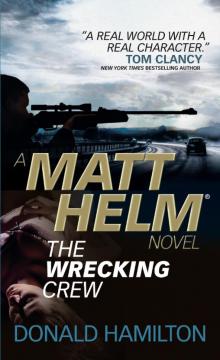 The Wrecking Crew
The Wrecking Crew The Devastators mh-9
The Devastators mh-9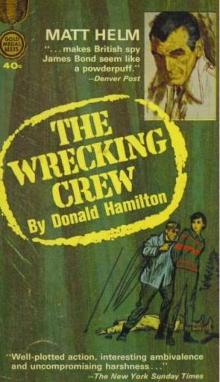 The Wrecking Crew mh-2
The Wrecking Crew mh-2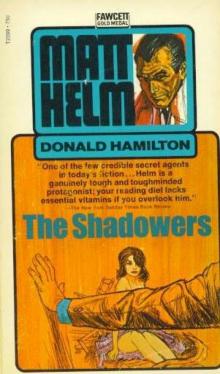 The Shadowers mh-7
The Shadowers mh-7 The Ambushers mh-6
The Ambushers mh-6 The Betrayers
The Betrayers The Terrorizers
The Terrorizers The Poisoners
The Poisoners The Devastators
The Devastators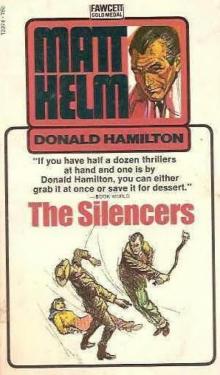 The Silencers mh-5
The Silencers mh-5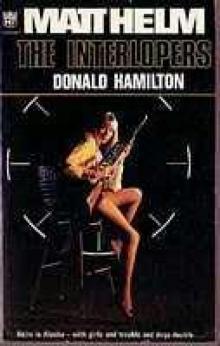 The Interlopers mh-12
The Interlopers mh-12 The Shadowers
The Shadowers The Annihilators
The Annihilators The Vanishers
The Vanishers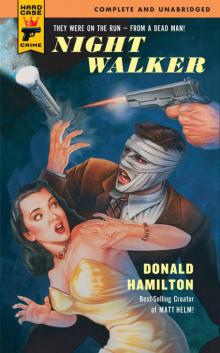 Night Walker
Night Walker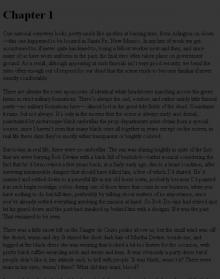 The Revengers
The Revengers The Frighteners
The Frighteners The Infiltrators
The Infiltrators The Intriguers mh-14
The Intriguers mh-14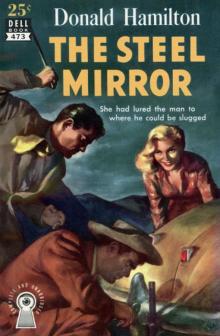 The Steel Mirror
The Steel Mirror The Menacers
The Menacers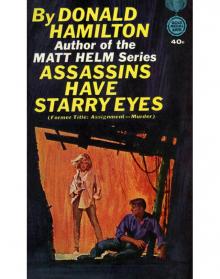 Assassins Have Starry Eyes
Assassins Have Starry Eyes Death of a Citizen
Death of a Citizen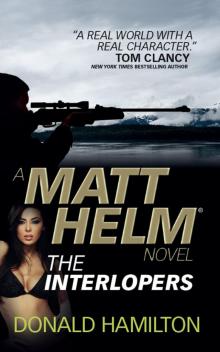 Matt Helm--The Interlopers
Matt Helm--The Interlopers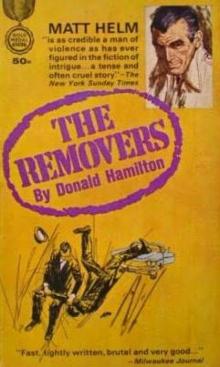 The Removers mh-3
The Removers mh-3 The Demolishers
The Demolishers Murder Twice Told
Murder Twice Told The Poisoners mh-13
The Poisoners mh-13 The Ambushers
The Ambushers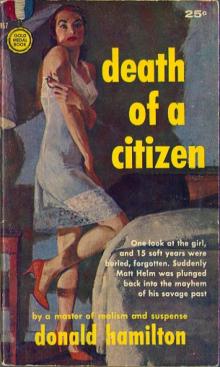 Death of a Citizen mh-1
Death of a Citizen mh-1 The Silencers
The Silencers The Removers
The Removers The Intimidators
The Intimidators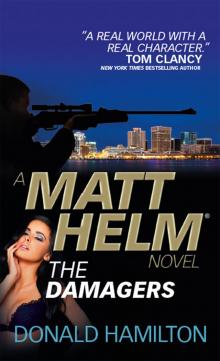 The Damagers
The Damagers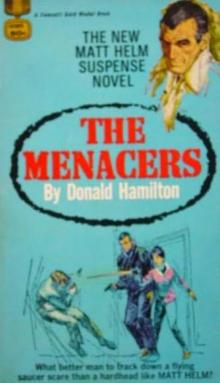 The Menacers mh-11
The Menacers mh-11 The Retaliators
The Retaliators Murderers' Row
Murderers' Row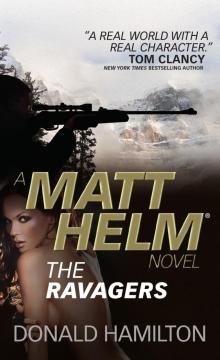 The Ravagers
The Ravagers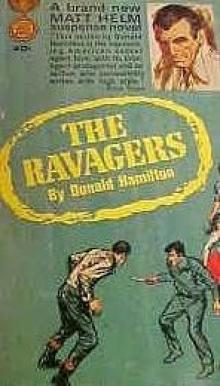 The Ravagers mh-8
The Ravagers mh-8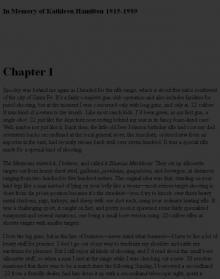 The Threateners
The Threateners The Betrayers mh-10
The Betrayers mh-10